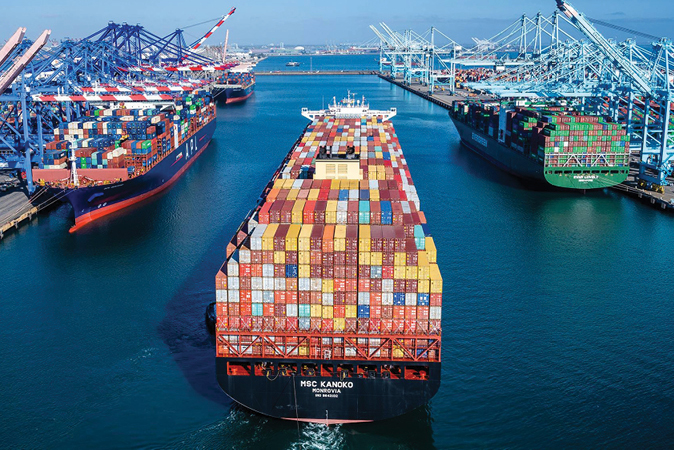|
By Amanda Hampton, Associate,
Nessle & Blakey
In June 2022, President Biden signed the Ocean Shipping Reform Act (OSRA) into law, making changes to the Shipping Act for the first time in over 20 years. As a major priority for the Biden -Harris Administration, the OSRA sought to improve supply chain fluidity, increase competition, and reduce shipping costs. The OSRA increased the Federal Maritime Commission’s (FMC) authority to regulate unfair shipping practices, shifted the burden of proof concerning the reasonableness of detention or demurrage charges to ocean carriers, and restricted ocean carriers’ ability to deny goods at ports that are ready to be exported. To expand on the OSRA provisions, Representatives Costa (D-CA) and Johnson (R-SD) each introduced new legislation to provide additional ocean shipping reforms.
Rep. Costa (D-CA) introduced the Ocean Shipping Anti-Trust Enforcement Act of 2023 to address foreign shipping companies that have “manipulated the ocean shipping industry and employed unfair trade practices, hurting American exporters and consumers.” The legislation would repeal the anti-trust exemption from federal laws granted to ocean carriers; preserve collective bargaining within the maritime industry; and allow FMC to submit input on mergers, acquisitions, and other transactions involving common carriers and marine terminal operators to the U.S. Department of Justice’s Anti-Trust Division. According to Rep. Costa, his bill protects U.S. exporters, shippers, and consumers from foreign shipping companies unjustly increasing container rates, issuing unfair detention and demurrage fees, and refusing cargo bookings for exports. One of the legislation’s cosponsors, Rep. Garamendi (D-CA), stressed the need for these protections, noting that ocean carriers receive an exemption from anti-trust laws that is not granted to the trucking, airline, or railroad industries.
The Ocean Shipping Anti-Trust Act was previously introduced by Rep. Costa during the last Congress, but the legislation did not move forward. The World Shipping Council spoke out against the bill, asserting that current anti-trust exemptions allow for more efficient goods movement and the proposed legislation would undermine industry competition. The organization previously opposed the OSRA, claiming that it did not address the root cause of supply chain congestion.
On March 28, Rep. Johnson introduced the Ocean Shipping Reform Implementation Act. Rep. Johnson explained that his legislation is necessary to limit foreign influences on U.S. supply chains and uphold fair trade practices. The measure proposes to prohibit certain ports from using the national transportation logistics public information platform (LOGINK) or similar systems provided by the People’s Republic of China and codify the Shipping Act’s “controlled carrier” definition to include state-controlled enterprises classified as non-market economies, thus subjecting them to special FMC oversight to ensure they do not unfairly use their positions against competitors.
|

Additionally, Rep. Johnson’s bill includes other provisions to improve supply chain data standards and facilitate more efficient goods movement. The proposal instructs the Bureau of Transportation Statistics to collect data from ports on dwell times and yard capacity, establishes a National Seaport Advisory Committee, authorizes FMC to set additional minimum service contract requirements for agreements between ocean common carriers and shippers, and requires FMC to provide Congress with an analysis of any trade imbalance stemming from the business practices of ocean carriers. While FMC Commissioner Bentzel has led a maritime transportation data initiative to identify best practices for data sharing, Rep. Johnson’s bill requires FMC to initiate a rulemaking creating a data standard for maritime freight logistics that includes a common lexicon of definitions and real time information exchange.
Executive Director of the Coalition for Reimagined Mobility Christine Weydig voiced support for the Ocean Shipping Reform Implementation Act’s ability to modernize the freight industry and support resilient supply chains “in the face of increasing geopolitical volatility.” Rep. Johnson’s bill also received industry support from the Consumer Brands Association, National Milk Producers Federation, Agriculture Transportation Coalition, and the National Industrial Transportation League. During a National Shipper Advisory Committee meeting on March 30, FMC Commissioner Bentzel acknowledged the Ocean Shipping Reform Implementation Act and conveyed appreciation that the legislation supports FMC’s development of a data standard.
On March 28, the House Committee on Transportation and Infrastructure Subcommittee on Coast Guard and Maritime Transportation hosted a hearing to discuss maritime transportation supply chain issues. During the hearing, Rep. Johnson inquired about best practices to harmonize supply chain data. In response, Executive Director of the Port of Long Beach Mario Cordero urged that additional funding is needed for programs attempting to harmonize industry data. He recommended that any data harmonization should result in an integrated system that all supply chain partners can access.
The Ocean Shipping Anti-Trust Enforcement Act and the Ocean Shipping Reform Implementation Act now await further action from their respective committees of reference.
Nessle & Blakey, Ltd. is a public affairs and
communications consulting firm based in
Washington, DC.
|


